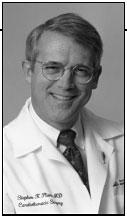Surgeon Steve Plume steps down from the Clinic presidency
After serving as president of the Dartmouth-Hitchcock Clinic for most of the 1990s—a decade that has seen significant national upheaval in medicine, both organizationally and financially —cardiothoracic surgeon Stephen Plume, M.D., has announced that he is stepping down from the administrative post. He plans to remain on the DMS faculty as a professor of surgery and will devote all of his efforts to patient care and research.
"I found myself spending more of my time proportionately on things I didn't enjoy nearly as much as the things that I used to do—like clinical surgery," Plume says.
Privilege: Yet he appreciates "the privilege of having leadership in this organization. I don't think there's any academic medical center in the country that has a better handle on the changes [in health care] that need to occur."
Plume, who joined the Clinic in 1977 and has been president since 1990, also plans to continue his involvement in quality improvement initiatives, a subject that he has lectured on internationally.

|
Steve Plume, president of the Clinic
since 1990, has stepped down to
focus on surgery and research. |
Quality improvement in health care systems has its roots in W. Edwards Deming's theories on total quality management as applied to industry. "Reflecting on how we practice," explains Plume, "is as important as practice itself. We need to find ways to build that into our daily work. To a certain extent, I found less time for that in the context of what's been labeled the Lahey debacle or the financial difficulties recently."
Stresses: Of the short-lived 1995-1997 merger between the Hitchcock Clinic and the Massachusetts- based Lahey Clinic, Plume comments, "It was a major disappointment that the Lahey combination didn't work. We thought it would be terrific to have a truly regional group practice."
But, he adds, "we just plain could not come to a comfortable, friendly, productive interaction with a minority of senior leadership. That fate has befallen others as well, so it's not a unique experience."
The Clinic also announced a $20-million loss in its southern region for fiscal year 1998, another problem shared by many other academic medical centers. It was ascribed to internal inefficiencies, unfavorable managedcare contracts, and unprofitable physician practices that had been acquired in the Seacoast area (see the Winter 1998 issue of Dartmouth Medicine).
"The financial issues that have been so stressful for the last couple of years have certainly been disappointing," Plume says. "We are experiencing the stresses that every other health-care system in this country is experiencing."
Guidance: Nevertheless, Plume "has moved Dartmouth-Hitchcock Clinic forward in a quickly changing environment which has seen many organizations challenged beyond their capabilities," commented F. Ray Keyser, Jr., chair of the Clinic Board of Trustees and former governor of Vermont, upon the September 10 announcement of Plume's resignation.
"His leadership and guidance for his colleagues throughout New Hampshire and Vermont," added Keyser, "have served as a model for success and have forti- fied for us all the notion of a nonprofit group of physicians working to enhance health for patients and non-patients alike."
Plume was instrumental, for example, in the formation over a decade ago of the Northern New England Cardiovascular Disease Study Group, which today serves as a national model for improving cardiac care. The regional group consists of members from six northern New England medical centers and includes clinicians (from surgeons to nurses to anesthesiologists to perfusionists), as well as epidemiologists and administrators.
During the 14 months prior to his resignation from the presidency, Plume had been splitting his time between administrative oversight of the Clinic and work as a full-time cardiothoracic surgeon at Concord Hospital. A permanent medical director has now been recruited for that heart program, which is a joint venture between DHMC and Concord Hospital.
Plume will be stepping down from his administrative duties on a schedule to be determined by the Clinic's Board of Trustees. Until a successor is chosen, leadership will be provided by Plume; Thomas Colacchio, M.D., chair of the Clinic's Lebanon Board of Governors; and Carl DeMatteo, M.D., medical director of the Clinic's southern region.
Plume, a 1964 graduate of Harvard College, received his M.D. from the University of Rochester and did five years of surgical residency in Rochester and two years of cardiothoracic surgery training in Toronto.
Exemplars: "The nicest thing that's happened," Plume says, re- flecting on his tenure in the leadership, "is to be able to bask in the reflected glory of some great work that other people around here have done. In many clinical and administrative arenas, folks at this institution have become nationally sought-after speakers, exemplars, and coinvestigators across a surprising number of disciplines.
"The Dartmouth trademark of trying to improve care is one that we together created."
Laura Stephenson Carter
If you would like to offer any feedback about this article, we would welcome getting your comments at DartMed@Dartmouth.edu.
